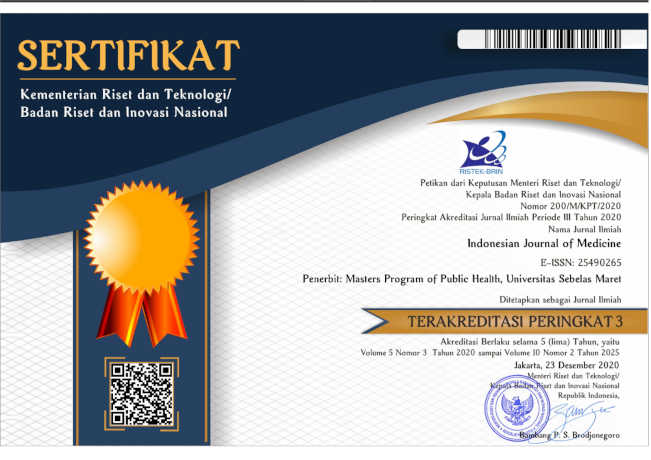Association between Serum Calcidiol Levels and Cognitive Function in Geriatric Patients
DOI:
https://doi.org/10.26911/theijmed.2020.5.3.289Abstract
Background: The role of vitamin D toward cognitive function is as neuroprotective in which vitamin D will increase neurotrophic factor production which contributes to supporting neuron life sustainability, development, and function. The study aims to analyze the association between calcidiol serum level and cognitive functions of geriatric patients.
Subjects and Method: A cross-sectional study was conducted at Geriatric Polyclinic of dr. Moewardi Hospital, Surakarta. A sample of 30 geriatric patients was selected randomly. The dependent variable was cognitive functions (MMSE score). The Independent variable was calcidiol serum level. The data were analyzed by Spearman test.
Results: There was no difference of calcidiol serum level with MMSE score (OR= 1.00; p= 0.478).
Conclusion: There was no difference in calcidiol serum level with MMSE score.
Keywords: cognitive functions, calcidiol
Correspondence: Sandy Anandhita. Masters Program in Family Medicine, Universitas Sebelas Maret. Jl. Ir. Sutami 36A, Surakarta, Central Java. Email: anandhitasandy3@gmail.com. Mobile: 082227940410
Indonesian Journal of Medicine (2020), 05(03): 185-190
https://doi.org/10.26911/theijmed.2020.05.03.02
References
Anjum I, Jaffery S, Fayyaz M, Samoo Z, An-jum S(2018). The role of vitamin D in brain health: A mini literature review. Cureus 10(7): e 2960. https://doi.org/10.7759%2Fcureus.2960.
Annweiler C (2016). Vitamin D in dementia prevention. New York Acad Sci. 1367-(1): 57-63. https://doi.org/10.1111/nyas.13058
Baumgart M, Snyder HM, Carrilo MC, Fazio S, Kim H, Johns H (2015). Summary of the evidence on modifiable risk factors for cognitive decline and dementia: A population-based perspective. Alzheimers Dement. 11(6): 718-726. https://doi.org/10.1016/j.jalz.2015.05.016.
Cooper SA, McLean G, Guthrie B, McConnachie A, Mercer S, Sullivan F, Morrison J (2015). Multiple physical and mental health comorbidity in adults with intellectual disabilities: Populationbased cross-sectional analysis. BMC Fam Prac. 16: 110. https://doi.org/10.1186/s12875-015-0329-3
Holick MF, Binkley NC, Bischoff-Ferrari HA, Gordon CM, Hanley DA, Heaney RP, Murad MH et al. (2011). Evaluation, treatment, and prevention of vitamin D deficiency: An endocrine society clinical practice guideline. J Clin Endocrinol Metab. 96(7): 1911–1930. https://doi.org/10.1210/jc.2011-0385.
Qizilbash N, Gregson J, Johnson ME (2015). BMI and risk of dementia in two million people over two decades: A retros-pective cohort study. Lancet Diabetes Endocrinol. 3(6): 431-436. https://doi.org/10.1016/S2213-8587(15)00033-9.
Rouch L, Cestac P, Hanon O, Cool C, Helmer C, Bouhanick B, Chamontin B, et al. (2015). Antihypertensive drugs, preven-tion of cognitive decline and dementia: A systematic review of observational studies, randomized controlled trials and meta-analyses, with discussion of potential mechanisms. CNS Drugs. 29(2): 113-130. https://doi.org/10.1007/s40263-015-0230-6
Setiati S, Harimurti K, Dewiasty E, Istanti R (2011). Predictors and scoring system for health-related quality of life in an Indonesian community dwelling elderly population. Acta Med Indones. 43-(4): 237-42. https://www.ncbi.nlm.nih.gov/pubmed/22156355.
Sommer I, Griebler U, Kien C, Auer S, Klerings I (2017). Vitamin D deficiency as a risk factor for dementia: A systematic review and meta-analysis. BMC Geriatrics. 17(1):16. https://doi.org/10.1186/s12877-016-0405-0.











